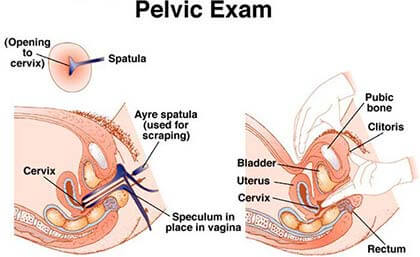To stay healthy, women should have a physical exam every year. Most of the time, the pelvic examination is a part of this annual exam. It’s also a time for the Obstetrician/Gynecologist to provide reassurance of normal anatomy and answer specific questions.
Pelvic Exam
 A pelvic examination is a complete physical exam of a woman’s pelvic organs by a health professional. A pelvic exam helps a health professional evaluate:
A pelvic examination is a complete physical exam of a woman’s pelvic organs by a health professional. A pelvic exam helps a health professional evaluate:
- Size of the vagina
- Position of the vagina
- Cervix
- Uterus
- Ovaries
It is an important part of preventive health care for all adult women. A pelvic exam is done to help detect:
- Certain cancers in their early stages
- Infections
- Sexually transmitted infections (STIs)
- Other reproductive system problems.
In some cases, a pelvic ultrasound may be performed. A pelvic ultrasound is a noninvasive diagnostic pelvic exam that produces images that are used to assess organs and structures within the female pelvis.
A Pelvic Exam May Be Done:
As part of a woman’s regular physical checkup. A Pap test may be done during the pelvic exam. For more information, see the topic Paps.
- To detect vaginal infections, such as yeast infections or bacterial vaginosis.
- To help detect sexually transmitted infections (STIs), such as chlamydia, herpes, gonorrhea, trichomoniasis, or human papillomavirus (HPV).
- To help determine the cause of abnormal uterine bleeding.
- To evaluate pelvic organ abnormalities, such as uterine fibroids, endometriosis, ovarian cysts, or uterine prolapse.
- To evaluate abdominal or pelvic pain.
Before prescribing a method of birth control (contraception). Some methods of birth control, such as a diaphragm or intrauterine device, require a pelvic exam to make sure the device fits properly. Collect evidence in cases of suspected sexual assault.
Patient Experience
What Is A Pelvic Exam During Pregnancy?
A pelvic exam during pregnancy is a routine check-up performed to monitor your health and the health of your developing baby. Usually, it is done on a regular basis during your pregnancy, beginning with your initial prenatal visit and increasing in frequency as your due date approaches. Also, a pelvic exam can be done anytime during your pregnancy if you have apparent changes in the pelvic area, are at risk for preterm labor, are having symptoms like spotting, or have a vaginal infection.
A pelvic exam usually involves an examination of the appearance, dimensions, and positioning of the pelvis by a medical professional.
It’s also important to remember that a pelvic exam consists of two main components:
- A manual examination entails a visual check of the vulva, or more precisely, the external genitalia, and an interior evaluation of the vaginal walls.
- A visual examination involves visually inspecting the pelvic organs by using a tube known as a speculum.
Little bleeding after a pelvic exam during pregnancy is quite typical. However, this can be an issue if there is significant bleeding following the procedure. Consult your doctor straight away if bleeding continues for more than twenty-four hours.
Before a Pelvic Exam:
Try to schedule the exam when you are not having your period since blood can interfere with the results of a Pap test. But if you have a new vaginal discharge or new or increasing pelvic pain, a pelvic exam may be done while you are having your period.
- Do not use douches, tampons, vaginal medications, or vaginal sprays or powders for at least 24 hours.
- Do not have sex for 24 hours prior to the exam if you have abnormal vaginal discharge.
At the Beginning of Your Visit, Tell Your Health Professional:
- If you are or might be pregnant.
- If you have any reproductive or urinary tract symptoms such as itching, redness, sores, swelling, or an unusual odor or increased vaginal discharge. If you have been performing regular vaginal self-exams, discuss any changes you have noticed with your health professional.
- If you are using a method of birth control.
- If this is your first pelvic exam.
- The first day of your last menstrual period and how long your period lasted.
- If you have had surgery or other procedures, such as radiation therapy, involving the vagina, cervix, or uterus.
No other special preparations are needed before having a pelvic exam. For your own comfort, you may want to empty your bladder before the exam.
Do you have questions? Would like to schedule an appointment with the best rated Brooklyn obgyn specialist, please contact our Brooklyn Heights office.
Brooklyn GYN Place
142 Joralemon Street, Suite 4CF
Brooklyn, NY 11201
(Brooklyn Heights)
718-624-0604
Would like to schedule an appointment with the top obgyn doctor in Downtown, Brooklyn, please contact our Brooklyn Heights office.
Our office has a 24/7 answering service to address
any Emergencies.
Disclaimer:
The information provided on this site is intended to educate the reader about certain medical conditions and certain possible treatment. It is not a substitute for examination, diagnosis, and medical care provided by a licensed and qualified health care professional. If you believe you, or someone you know suffers from the conditions described herein, please see your health care provider immediately. Do not attempt to treat yourself or anyone else without proper medical supervision.
- Our office has a 24/7 answering service to address any emergencies.
